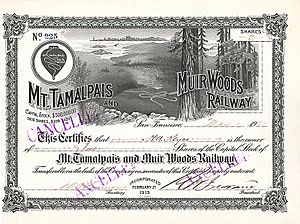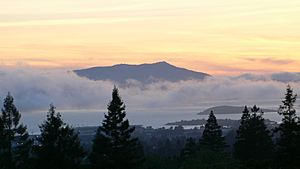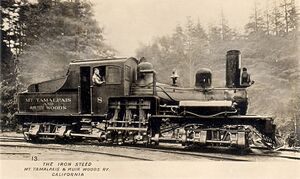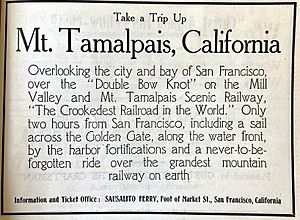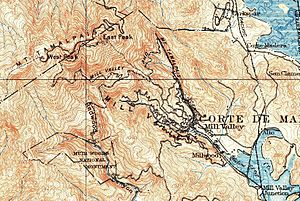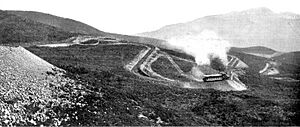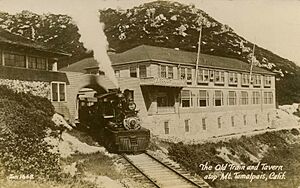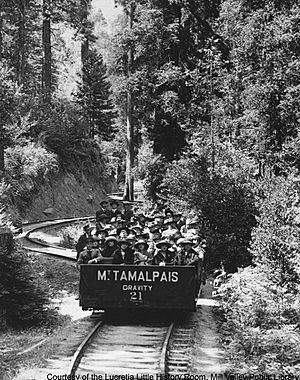Mount Tamalpais and Muir Woods Railway facts for kids
The Mount Tamalpais & Muir Woods Railway was a special train line that took tourists on a scenic trip up Mount Tamalpais in Marin County, California. It ran from the town of Mill Valley all the way to the mountain's east peak. This railway was about 8.2 miles (13.2 km) long and had an extra 2.9-mile (4.7 km) branch line that went to Muir Woods.
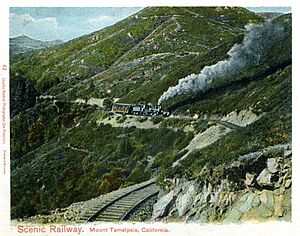
The railway started in January 1896 and closed in the summer of 1930. Even though it was first planned to be an electric trolley, it ended up using special geared steam locomotives. People called it the "Crookedest Railroad in the World" because its path was so steep and curvy. It wound through beautiful landscapes to a tavern at the top of the mountain, where visitors could enjoy amazing views of the San Francisco Bay Area. The railway was very popular, but it eventually closed after a big fire in 1929 and because more people started driving cars to the mountain.
Contents
Why Build a Mountain Railway?
Mount Tamalpais: A Natural Wonder
Mount Tamalpais has tall peaks that rise above redwood forests and grassy hills in Marin County. Its highest point, East Peak, is 2,571 feet (784 meters) high. In the late 1800s, Marin County was mostly known for its lumber. But some people saw its potential as a beautiful place for vacations, especially for those living in busy San Francisco, which was just a short distance away.
Mill Valley, a town at the base of Mount Tamalpais, was first planned in the late 1880s. It was named after a sawmill that cut down trees from the area. After the trees were gone, the land was sold for homes, many of which were vacation spots. Getting to Mill Valley was easy thanks to ferry and train services from San Francisco.
Because it was so easy to reach, smart business people realized they could turn the undeveloped hills north of San Francisco into a fun place for tourists. Sidney B. Cushing was one of these people. He owned a hotel near Mill Valley. The hills around Mill Valley were very steep, so a reliable way to get up them was needed. A railway seemed like the best idea at the time, and Mount Tamalpais was the perfect spot for it.
Building the "Crookedest Railroad"
The idea for the railway first came from Louis L. Janes, who worked for a land company in Mill Valley. Sidney B. Cushing became the president of the new railway company, which was first called the Mill Valley and Mount Tamalpais Scenic Railway. Money for the project came from different sources, including influential residents like A. E. Kent, who gave land in exchange for company stock. His son, William Kent, later helped create the Muir Woods National Monument, which became a popular stop on the railway.
Construction of the railway began on February 5, 1896. The plan was for the tracks to go from the train station in Mill Valley up to the top of Mount Tamalpais. There was even a plan to extend it down to Bolinas Beach, but that never happened. The original idea for an electric trolley line also changed, and the railway ended up using steam locomotives.
Over 200 workers from different countries helped build the line. They faced tough conditions, like low pay and expensive housing, which led to some protests. Despite these challenges and some local complaints about noisy trains, the construction continued quickly. In just six months, the railway was finished, costing $55,000 to build the tracks and another $80,000 for equipment. The last spike was hammered in on August 18, 1896, and the first passenger train ran just four days later.
How the Railway Worked
The Winding Path Up the Mountain
The mountain railway started at a station in Mill Valley, about 70 feet (21 meters) above sea level. This building changed its look over the years and is now a bookstore and cafe. Trains headed north, winding through Mill Valley, past maintenance shops and water tanks.
The tracks followed a stream for a while, then curved many times as they climbed higher. At "Milepost One," the elevation was about 300 feet (91 meters). The path continued with many more curves, reaching "Milepost Three" at 700 feet (213 meters). Today, parts of the old railway path are fire roads or hiking trails.
At "Milepost Four," around 1,000 feet (305 meters) high, the railway entered a famous section called the "Double Bow Knot." Here, the tracks looped back and forth five times to gain a lot of height quickly. There was a small station called Mesa Station here, with water tanks for the steam engines. From Mesa Junction, a branch line was added in 1907 that went to Muir Woods, bringing the first tourists to this beautiful redwood forest.
The journey continued past "Milepost Five" (1,350 feet/411 meters), where a train accident once happened. Then it went past "Milepost Six" (1,730 feet/527 meters) and the West Point Inn. Finally, after more curves, the train reached its last stop, the Tamalpais Tavern, at an elevation of 2,436 feet (742 meters).
The Many Curves of the Line
The railway climbed a very steep slope from Mill Valley to the top of Mount Tamalpais. To make it possible for steam trains to climb, the tracks had to avoid being too steep. This meant the railway had to wind its way back and forth across the mountain. Even though the peak was only a few miles from Mill Valley in a straight line, the railway had to travel 8.19 miles (13.18 km) to get there.
The railway was famous for its many curves. Out of its 8.19 miles, only about 3.28 miles (5.28 km) were straight track. The rest was made up of 266 curves! Some of these curves were very tight, with a radius as small as 70 feet (21 meters). This is why it was called the "Crookedest Railroad in the World."
Fun with Gravity Cars
One of the most exciting things about the railway was its "gravity cars." These were special four-wheeled carts introduced in 1902 that used the mountain's steep slope to roll downhill. A person called a "gravityman" sat in the front and controlled the speed using two brake levers.
Gravitymen had to follow a strict speed limit of 12 miles per hour (19 km/h) as they glided down the mountain to Muir Woods or Mill Valley. These gravity cars ran on a schedule, just like the steam trains, which was important for safety on the single track. After their downhill trip, the gravity cars were towed back up to the summit by the steam engines, ready for the next fun ride.
The Powerful Steam Engines
The Mount Tamalpais & Muir Woods Railway used several different steam locomotives to pull its trains up the steep grades. Most of these were "Shay" or "Heisler" type locomotives, which are special geared engines designed for climbing steep and curvy tracks.
Here are some of the engines that worked on the line:
| Engine Number | Builder | Type | Year Built | Notes |
|---|---|---|---|---|
| No. 498 | Lima Locomotive Works | 2-truck Shay locomotive | 1896 | The very first engine to run on the railway. |
| No. 1 | Lima Locomotive Works | 2-truck Shay locomotive | 1900 | Sold in 1904. |
| No. 2 | Stearns Manufacturing Company | 2-truck Heisler locomotive | 1896 | Called the Bull; involved in the railway's only fatal accident. |
| No. 3 | Stearns Manufacturing Company | 2-truck Heisler locomotive | 1898 | Named the S.B. Cushing; replaced due to design issues. |
| No. 3 (Replacement) | Lima Locomotive Works | 2-truck Shay locomotive | 1901 | Named the Tamalpais; used for construction of the Hetch Hetchy Reservoir. |
| No. 4 | Lima Locomotive Works | 2-truck Shay locomotive | 1903 | Sold in 1930 and scrapped in 1931. |
| No. 5 | Lima Locomotive Works | 2-truck Shay locomotive | 1906 | Later shipped to the Philippines. |
| No. 6 | H.K. Porter, Inc. | 0-4-0 tank | 1906 | A smaller tank engine. |
| No. 7 | Lima Locomotive Works | 2-truck Shay locomotive | 1907 | Also sold and shipped to the Philippines. |
| No. 8 | Lima Locomotive Works | 2-truck Shay locomotive | 1912 | Used by Shell Oil and later for building the Hoover Dam. |
| No. 9 | Heisler Locomotive Works | 2-truck Heisler locomotive | 1920 | The only engine from the railway that still exists today; it's being restored! |
The End of the Line
On July 2, 1929, a large wildfire, pushed by strong winds, swept down Mount Tamalpais. It came very close to the Mill Valley train station, and nearly a hundred homes burned down. The last train coming down the mountain carried 65 passengers to safety through the smoke. The heat from the fire even made snakes seek refuge on the tracks, making the rails slippery. The train crew had to use a lot of sand to keep the train from going too fast.
After this fire, and as more and more people started owning cars and could drive to the mountain's summit, fewer people rode the railway. This led to the railway closing in the summer of 1930.
A Lasting Legacy
Even though the railway is gone, its story lives on. On May 3, 2009, a small museum opened at the former East Peak yard of the Mt. Tamalpais and Muir Woods Railway. The "Gravity Car Barn" houses a recreated gravity car, which can roll out on 84 feet (26 meters) of track. Volunteers from the "Friends of Mt. Tam" group run the museum on weekends. Visitors can see displays and watch a short film that tells the fascinating story of this unique mountain railway.
 | Sharif Bey |
 | Hale Woodruff |
 | Richmond Barthé |
 | Purvis Young |


